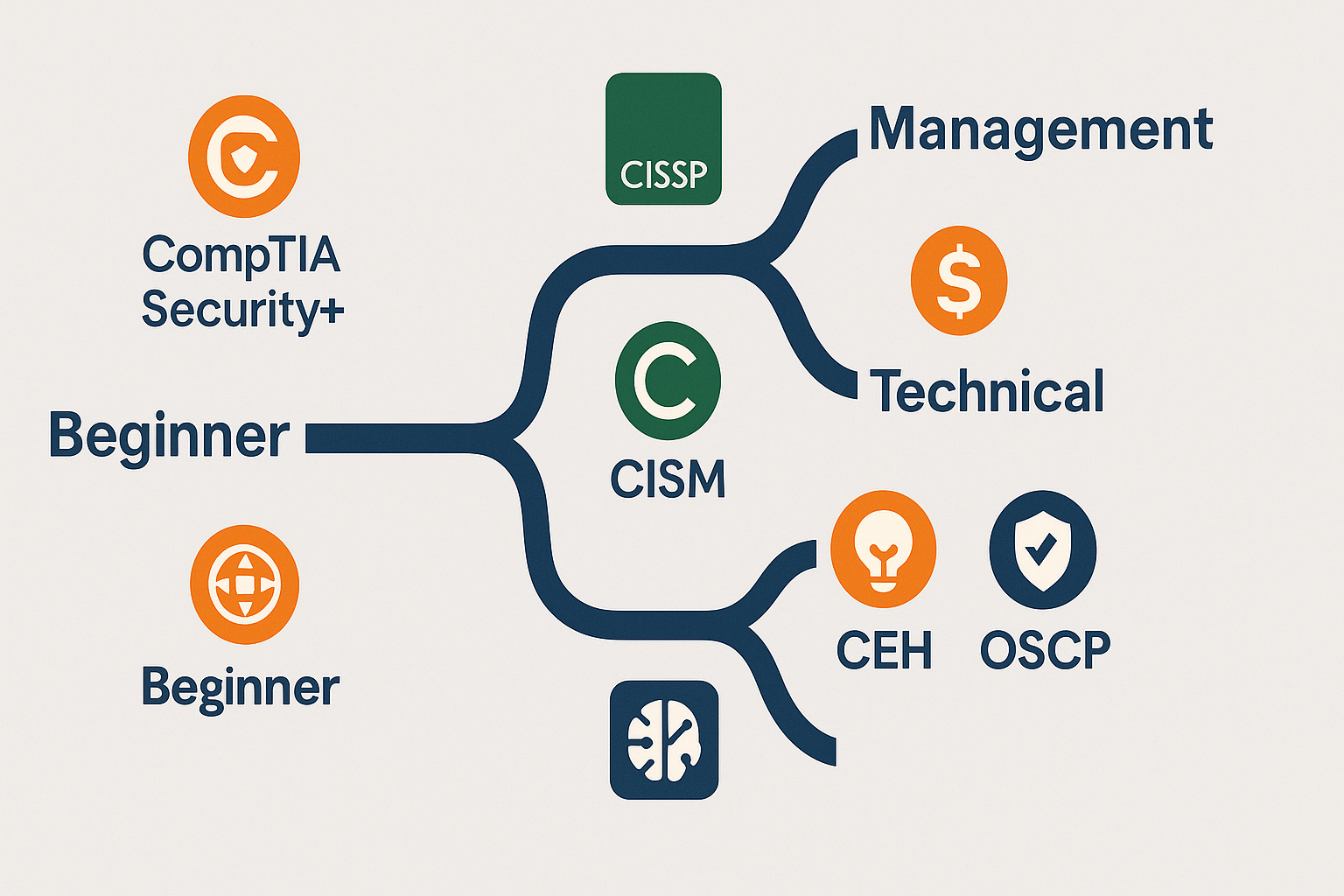It’s Not a Talent Shortage, It’s a Skills Shortage
You’ve probably heard about the massive talent shortage in cybersecurity. With over 500,000 open roles in the U.S. and a global deficit of 4 million professionals, it seems like companies are desperate to hire anyone they can find. But the real story in 2025 is more specific.
A recent study from SANS/GIAC revealed that over half of cybersecurity leaders believe the core issue isn’t a lack of people, but a lack of people with the right skills. This “skills gap” means companies aren’t just filling seats anymore. They’re looking for professionals with proven, job-ready expertise to defend against increasingly sophisticated threats.
This is where certifications come in. For hiring managers, a certification is a third-party guarantee that you can do the job. In fact, technical skills and certifications have now surpassed traditional work experience and degrees as the most valued qualifications. They de-risk the hiring process, which is why certified professionals command a significant cybersecurity salary boost.
What Makes a Certification Actually Valuable?
Not all certifications are created equal. The ones that lead to the biggest paychecks are those that solve major business problems, are in high demand, and are respected across the industry. Think about it from an employer’s perspective: a certification in security governance helps them avoid millions in regulatory fines, while a credential in penetration testing prevents a data breach that could cripple their reputation.
When you can prove you have the skills to mitigate that level of risk, your value skyrockets. Certifications generally fall into a few categories:
- Foundational: These cover the fundamentals and are the perfect starting point.
- Specialized: These dive deep into a specific area, like cloud security or ethical hacking.
- Vendor-Specific: These prove your expertise with a specific company’s technology (like AWS or Cisco).
- Industry-Specific: These are tailored for sectors with unique rules, like healthcare or finance.
Best of all, these certifications build on each other. Earning a foundational cert like CompTIA Security+ can actually help you meet the experience requirements for an advanced one like CISSP, putting you on the fast track to a top-tier salary.
The Best Cybersecurity Certifications for 2025
Let’s break down the certifications that consistently deliver the highest return on investment. Each one targets a different career path, so you can find the perfect fit for your goals.
Certified Information Systems Security Professional (CISSP): The Gold Standard for Security Leaders
- Who It’s For: The CISSP is the MBA of cybersecurity. It’s for experienced professionals who want to prove they have both the technical knowledge and the management vision to design, build, and run an entire security program. It’s also the single most requested certification in U.S. job postings.
- The Details:
- Governing Body: (ISC)²
- Prerequisites: You need five years of full-time experience in at least two of the eight CISSP domains. A relevant degree or another approved certification (like Security+) can knock off one year of that requirement.
- Exam: A 3-hour adaptive test with 100-150 questions. It costs $749.
- Maintenance: You’ll need to earn 120 CPE credits over three years and pay a $135 annual fee to keep it active.
- Jobs & Salary: With an average U.S. base salary around $134,202, the CISSP is your ticket to the C-suite. It opens doors to roles like Chief Information Security Officer (CISO) ($217,127), Security Architect ($160,065), and Senior Security Consultant ($142,737).
Certified Information Security Manager (CISM): For Masters of Security Strategy
- Who It’s For: If CISSP is about building the security program, CISM is about running it like a business. This certification from ISACA is for managers who excel at governance, risk management, and aligning security with company goals.
- The Details:
- Governing Body: ISACA
- Prerequisites: Five years of information security experience, with at least three of those in a management role. Holding a CISSP can waive two years of this requirement.
- Exam: A 150-question multiple-choice test. The cost is $575 for ISACA members and $760 for non-members.
- Maintenance: Requires 120 CPE hours over three years, plus an annual fee.
- Jobs & Salary: CISM holders report an average salary of over $149,000, with total compensation often hitting $165,863. It’s the perfect credential for roles like Information Security Manager ($131,119), IT Director ($147,333), and CISO ($189,016).
Certified Ethical Hacker (CEH): Think Like an Attacker
- Who It’s For: The CEH teaches you to beat hackers at their own game. Offered by the EC-Council, this cert proves you know how to find system vulnerabilities using the same tools and techniques as malicious attackers.
- The Details:
- Governing Body: EC-Council
- Prerequisites: You’ll need to either complete an official training course or show proof of two years of information security experience.
- Exam: A 4-hour, 125-question multiple-choice exam. The voucher costs around $1,199, and official training can range from $1,699 to $3,499.
- Maintenance: Requires 120 continuing education credits over three years.
- Jobs & Salary: The average total pay for a CEH is between $126,547 and $136,000. It’s a must-have for hands-on roles like Penetration Tester, Vulnerability Analyst, and Security Consultant.
Offensive Security Certified Professional (OSCP): The Ultimate Hands-On Challenge
- Who It’s For: The OSCP is legendary for its difficulty—and its value. It’s not about what you know; it’s about what you can do. This is a purely hands-on exam where you have to hack into a series of live machines, making it the benchmark for real-world penetration testing skills.
- The Details:
- Governing Body: OffSec
- Prerequisites: You must complete the PEN-200 course to be eligible. A solid understanding of networking and Linux is highly recommended.
- Exam: A grueling 24-hour practical exam. You’re given access to a network of vulnerable machines and have to compromise them, then write a professional report on your findings. The cost starts at $1,749, which includes the required course and lab access.
- Maintenance: The standard OSCP is a lifetime certification. A newer version, OSCP+, requires renewal every three years.
- Jobs & Salary: While specific OSCP salary data is harder to find, its reputation unlocks elite, high-paying jobs. It’s the go-to cert for Penetration Testers and Red Team Operators, where lead positions easily command salaries from $115,000 to over $160,000.
CompTIA Security+: The Essential Starting Point
- Who It’s For: Security+ is the single most important foundational certification in cybersecurity. It covers the core, vendor-neutral skills you need for any security role, making it the ideal first certification for anyone serious about the field.
- The Details:
- Governing Body: CompTIA
- Prerequisites: None are required, but CompTIA suggests having the Network+ cert and about two years of IT admin experience.
- Exam: A 90-minute exam with up to 90 questions, including hands-on, performance-based items. The fee is $425.
- Maintenance: It’s valid for three years and can be renewed by earning Continuing Education Units (CEUs).
- Jobs & Salary: Don’t let the “foundational” label fool you. Security+ is a requirement for countless jobs and provides a fantastic salary boost early in your career. It prepares you for roles like Security Administrator ($88,043 – $112,841) and Security Engineer ($96,359 – $157,496).
Which Certification Is Right for You?
Choosing a certification isn’t just about salary—it’s about matching your experience and career goals. The highest-paying certs require years of dedication, so it’s crucial to pick the right path.
The biggest split is between management and hands-on technical certs. CISSP and CISM are for strategists who manage risk and policy. CEH and OSCP are for the technical experts in the trenches. Security+ is the bridge that gives you the foundational knowledge to go in either direction.
Another key difference is how you’re tested. Certs like CISM and CEH use multiple-choice questions to test what you know. The OSCP is different; its practical exam tests what you can do. A hiring manager for a CISO role wants the broad knowledge of a CISSP, while a manager hiring a pentester wants the proven hacking skills of an OSCP.
Your Personal Certification Roadmap
A lucrative cybersecurity career is built by stacking certifications strategically as your experience grows.
For Beginners and Career Changers
Breaking into cybersecurity can feel intimidating, but there’s a clear path. Start by building a solid foundation—no experience necessary.
- Start with the Google Cybersecurity Certificate: This online program is designed for absolute beginners and can be finished in under six months. You’ll learn job-ready skills in Linux, SQL, Python, and industry tools like SIEMs.
- Get Your CompTIA Security+: The Google Certificate is specifically designed to prepare you for the Security+ exam. Earning this globally recognized credential is the baseline for thousands of entry-level security jobs.
For Mid-Career Tech Professionals
If you’re already a network or system admin, you’re in a prime position to pivot to a higher-paying security role.
- The Offensive Path: If you love the hands-on technical work, get the CEH to learn the attacker’s mindset. Then, to prove you’re among the elite, tackle the OSCP. This one-two punch is a golden ticket for penetration testing jobs.
- The Management Path: If you’re aiming for leadership, leverage your experience to qualify for a management cert. The CISSP is perfect for a broad CISO or architect role, while the CISM is tailored for those who want to focus on aligning security with business strategy.
For Experienced Security Pros
Already in the field? The path to the biggest paychecks is moving from technical work to strategic leadership. Earning your CISSP or CISM is the final step, signaling that you have the business sense and vision for top executive roles like CISO and Security Director.
Top-Tier Study Resources to Get You Started
Passing these exams takes serious preparation. Luckily, there are great resources for every learning style.
- Official Training: Your first stop should always be the source. (ISC)², ISACA, EC-Council, CompTIA, and OffSec all offer official study guides and practice exams that are perfectly aligned with their tests.
- Training Bootcamps: Companies like the SANS Institute, Infosec Institute, and Cyberkraft offer intensive, instructor-led bootcamps designed to get you ready fast.
- Online Platforms: Sites like Coursera offer flexible and affordable courses from industry experts.
- Practice Labs: For technical certs like CEH and OSCP, theory isn’t enough. You need hands-on practice. Platforms like VulnHub and PentesterLab offer safe, legal environments to hone your hacking skills.
Frequently Asked Questions (FAQs)
How much does each certification exam cost?
Costs vary widely. The CompTIA Security+ is $425. The CISSP is $749. The CISM is $575 for members and $760 for non-members. The CEH voucher is about $1,199, and the OSCP starts around $1,749 because it includes a mandatory course.
What are the renewal requirements and fees?
Most high-level certs require you to stay current.
- CISSP: Requires 120 CPE credits over three years and a $135 annual fee.
- CISM: Requires 120 CPEs over three years plus an annual fee.
- CEH: Requires 120 credits over three years and an $80 annual fee.
- Security+: Requires renewal every three years by earning 50 CEUs, which costs $150 for the cycle.
- OSCP: The standard OSCP is a lifetime certification. The newer OSCP+ requires renewal every three years.
Can I take an advanced exam like CISSP without the required experience?
Yes. If you pass the CISSP exam without the full five years of experience, you become an “Associate of (ISC)².” This gives you six years to gain the necessary experience to earn the full certification.
Which certification has the best ROI?
The best Return on Investment (ROI) depends on where you are in your career. For a senior manager, the CISSP or CISM unlocks executive roles and the highest salaries. For a technical expert, the OSCP proves elite hands-on skills that are in extremely high demand. And for a newcomer, the Security+ offers an immediate ROI by getting your foot in the door for a huge range of jobs.
Your Next Step to a High-Paying Career
The cybersecurity industry has a clear message: it needs people with proven skills. Professional certifications are the fastest and most effective way to advance your career and earn a top-tier salary. The key is to choose a path that matches your experience and goals, whether that’s hands-on technical mastery or strategic leadership.
If you’re ready to start your journey, there’s never been a better time. The Google Cybersecurity Certificate is the perfect on-ramp for beginners, teaching you job-ready skills in under six months with no experience required. It’s even designed to prepare you for the CompTIA Security+ exam, giving you a powerful dual credential to launch your career.








[…] every potential certificate or course through these three […]
[…] integrating its courses directly into university programs for academic credit. This move makes its top certificates even more valuable, creating a clear path from an online course to a formal degree […]
[…] cyberattacks on the rise, cybersecurity is a top priority for every company. This has created a hot job market, with the U.S. Bureau of Labor […]